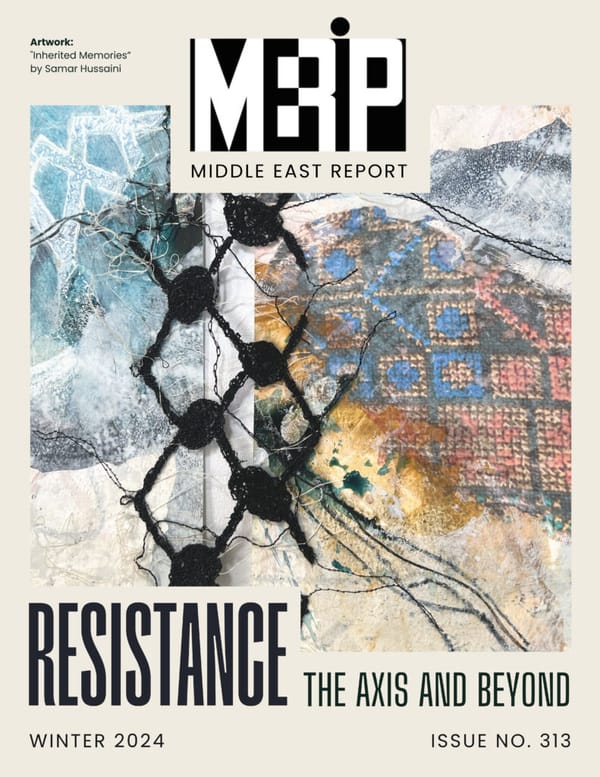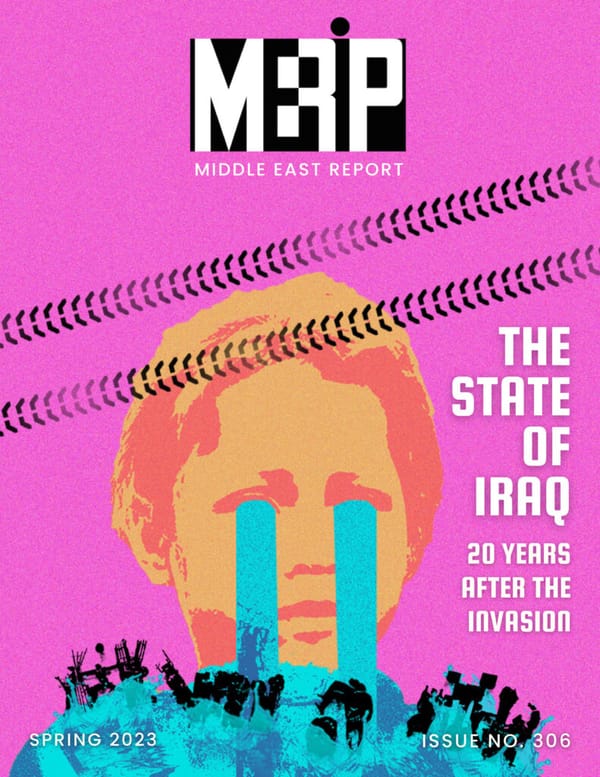
Latest Issue:
Reconstruction and Ruin

Rebuilding Gaza from the Ground Up
An Interview with Minerva Fadel of Architects for Gaza
Mapping Destruction—A Conversation with Jamon Van Den Hoek of Conflict Ecology
Changing scales of conflict and advances in satellite imagery are reshaping how damage is assessed.
MERIP Updates
The MERIP Podcast Episode 16: Iman Ali
In today’s episode Iman Ali talks about her recently published article, “Repair Amid Ongoing Ruination—Rebuilding Dahiyeh Once More,” which appeared in our Winter 2025 issue, “Reconstruction and Ruin.” Iman Ali, a doctoral candidate in anthropology at Cornell University, has been conducting fieldwork in Lebanon to investigate the impactsThe MERIP Podcast Episode 15: In the Archive with Brahim El Guabli
On this episode of our In the Archive series, MERIP’s Executive Director, James Ryan, speaks with Brahim El Guabli about his essay, “The Sub-Saharan Turn in Moroccan Literature,” which appeared in the Spring 2021 issue of Middle East Report, “Maghreb from the Margins.” El Guabli speaks about how migration
Call for Pitches—Visual Art & Cultural Production in the Middle East and North Africa
MERIP is seeking pitches for our Summer 2026 issue exploring visual art and cultural production in the Middle East and North Africa. We invite submissions that center artistic practices and cultural histories while attending to the political, social and material conditions in which art is made and experienced. We welcome
The MERIP Podcast Episode 14: The MERIP Roundtable, On Iran's Protests
In this installment of the MERIP Roundtable podcast, we discuss the latest wave of protests in Iran. The protests began on December 28, 2025, as merchants and bazaar workers reacted negatively to new budgetary measures announced by President Masoud Pezeshkian. The protests snowballed in the first week of January, reachingMERIP's Top 10 of 2025
Dear Friends and Comrades, Today we’re sharing with you the 10 most-viewed articles we published in 2025. Each of these pieces provides crucial, current analysis of regional dynamics driven by Israel’s ongoing war in Gaza: from the impacts of AI as both a technology of war and toolThe MERIP Podcast Episode 13: Ned Leadbeater
Today on the podcast we have an interview with Ned Leadbeater, a researcher and analyst based in Britain who recently wrote an article for our Summer/Fall double issue on the material politics of normalization titled, “Fiber Optics and the Hidden Politics of Connectivity.” His article explores the politics surrounding
Current Analysis



Dirty Work—The Hidden Machinery and Human Toll of Europe’s Broken Recycling Trade
As Europe sends increasing amounts of illegal waste to Turkey, activists and investigators are revealing how the country’s state-backed recycling boom depends on fraud, off-the-books subcontracting and a rising death toll of migrant laborers.
'We Want to Breathe'—Dispatch from Gabes, Tunisia
A few weeks into the 2025 school year, in a middle school in Chott Essalem, Tunisia, students began to feel dizzy and light-headed and their throats tightened. Within minutes, they began collapsing, one after another. More mass asphyxiation events, as residents describe them, occurred throughout the month of September andPrimers

Palestine and Israel—A Primer
This primer provides an overview of key actors, organizations, historic events, political developments and diplomatic initiatives that have shaped the status and fate of Palestinians and the State of Israel from the late nineteenth century to the present. It is divided into topical sections and organized roughly chronologically—although some


MERIP Updates
The MERIP Podcast Episode 16: Iman Ali
In today’s episode Iman Ali talks about her recently published article, “Repair Amid Ongoing Ruination—Rebuilding Dahiyeh Once More,” which appeared in our Winter 2025 issue, “Reconstruction and Ruin.” Iman Ali, a doctoral candidate in anthropology at Cornell University, has been conducting fieldwork in Lebanon to investigate the impactsThe MERIP Podcast Episode 15: In the Archive with Brahim El Guabli
On this episode of our In the Archive series, MERIP’s Executive Director, James Ryan, speaks with Brahim El Guabli about his essay, “The Sub-Saharan Turn in Moroccan Literature,” which appeared in the Spring 2021 issue of Middle East Report, “Maghreb from the Margins.” El Guabli speaks about how migration
Call for Pitches—Visual Art & Cultural Production in the Middle East and North Africa
MERIP is seeking pitches for our Summer 2026 issue exploring visual art and cultural production in the Middle East and North Africa. We invite submissions that center artistic practices and cultural histories while attending to the political, social and material conditions in which art is made and experienced. We welcome
The MERIP Podcast Episode 14: The MERIP Roundtable, On Iran's Protests
In this installment of the MERIP Roundtable podcast, we discuss the latest wave of protests in Iran. The protests began on December 28, 2025, as merchants and bazaar workers reacted negatively to new budgetary measures announced by President Masoud Pezeshkian. The protests snowballed in the first week of January, reachingMERIP's Top 10 of 2025
Dear Friends and Comrades, Today we’re sharing with you the 10 most-viewed articles we published in 2025. Each of these pieces provides crucial, current analysis of regional dynamics driven by Israel’s ongoing war in Gaza: from the impacts of AI as both a technology of war and toolThe MERIP Podcast Episode 13: Ned Leadbeater
Today on the podcast we have an interview with Ned Leadbeater, a researcher and analyst based in Britain who recently wrote an article for our Summer/Fall double issue on the material politics of normalization titled, “Fiber Optics and the Hidden Politics of Connectivity.” His article explores the politics surrounding










